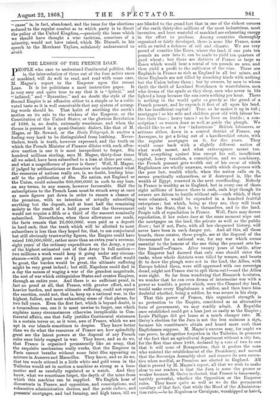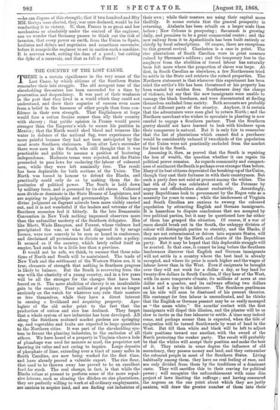THE LESSON OF THE FRENCH LOAN.
PEOPLE who care to understand Continental politics, that is, the inter-relation of three out of the four active races .of mankind, will do well to read, and read with some care, M. Magne's report to the Emperor upon the recent _Loan. It is for politicians a most instructive paper. It is very easy and quite true to say that it is lyrical," and "inflated," and "Byzantine," and no doubt the style of the Second Empire is as offensive either to a simple or to a culti- vated taste as it is well conceivable that any system of arrang- ing words should be. That habit of ascribing the earth's motion on its axis to the wisdom of the Emperor, or the Constitution of the United States, or the glorious Revolution -of 1688, is, no doubt, extremely wearisome, and when the theme is pursued in a quasi-Ossianic dialect, like that of M. Magne, or Mr. Seward, or the Daily Telegraph, it excites a feeling very hard to be distinguished from loathing. Never- theless, truth is truth, however expressed, and the truth on which the French Minister of Finance dilates with such offen- sive unction is one it is most inexpedient to forget. Six hundred millions sterling, says M. Magne, thirty-four times all we asked, have been subscribed to a loan at three per cent., .and what a magnificence of power is there! Well, M. Magne, if judged by arithmeticians or financiers who understand what the resources of nations really are, is, no doubt, lending him- self to the publication of fibs. No nation, not England or the Union, could subscribe 600,000,000/. in cash to any loan, .on any terms, in any season, however favourable. Half the subscriptions to the French Loan must be struck away at once as mere figures put down in order to ensure a chance of the premium, with no intention of actually subscribing anything but the deposit, and at least half the remaining moiety as the result of a bold guess that the Government would not require a fifth or a third of the amount nominally .subscribed. Nevertheless, when these allowances are made, the facts remain that 26,000,000/. were paid as a deposit in hard cash, that the tenth which will be allotted to most -subscribers is less than they hoped for, that, to use conjectural but still obviously trustworthy figures, the Empire could have raised 100,000,000/., rather more than an extra year's revenue, .eight years' of the ordinary expenditure on the Army, a year -of the highest estimated cost of that Army in full motion— two millions a week would keep it going under any circum- stances—with great ease at 41 per cent. The effort would be great, the burden would be great, the ultimate suffering might be very great indeed ; but still, Napoleon could find in a day the means of waging a war of the grandest magnitude, the sort of war which extinguishes States and creates Empires, through an entire year. And there is no sufficient proof, in fact no proof at all, that France, with greater effort, and a heavier burden, and more ultimate suffering, could not repeat the exertion, could not, that is, keep up a national war, in the highest, fullest, and most exhausting sense of that phrase, for -two full years. Even the first fact, which is beyond doubt, is a tremendous one, one it is most unwise to forget, one which explains many circumstances otherwise inexplicable in Con- tinental affairs, one that fully justifies Continental statesmen in a certain terror or, as it were, awe of France, which we are apt in our islands sometimes to despise. They know better -than we do what the resources of France are, how splendidly great are the latent powers at the disposal of any French ruler once fairly engaged in war. They know, and so do we, that France is organized permanently like an army, that the exquisite mechanism really works, that the Emperor in Paris cannot breathe without some faint film appearing on mirrors in Auxerre and Marseilles. They know, and so do we, that ten words uttered in a little white and gold room in the Tuileries would set in motion a machine as strong as a loco- motive and as carefully regulated as a watch. And they know, what we sometimes forget, the depth of the mine from which this machine can be supplied. We English hear of discontents in France, and opposition, and conscriptions, and exhaustive administrative devices, and the petite culture, and Peasants' mortgages, and bad farming, and high taxes, till we are blinded to the grand fact that in one of the richest corners of the earth thirty-five millions of the most industrious, most inventive, and least wasteful of mankind are exhausting energy in the effort to produce. Among countries thoroughly organized or fairly developed, there is none like France, none with so varied a richness of soil and climate. We are very proud of counties like Essex, where the land, if one puts ten pounds an acre into it, can be made to yield ten quarters of good wheat ; but there are districts of France as large as Essex which would bear a rental of ten pounds an acre, and then yield a profit to the cultivator of the vine. There are Englands in France as rich as England in all but mines, and those Englands are not tilled by slouching hinds with nothing but the Union before them ; but by owners, by men to whose thrift the thrift of Lowland Scotchmen is wastefulness, men who dream of the spade as they sleep, men who never in life lighted a lamp because the sun costs nothing per hour. There is nothing in the world quite so greedy as the greed of a French peasant, and he expends it first of all upon his land. He has insufficient capital ? True, so he makes it up in toil ; mortgages ? so his wife and children grow old with labour be- fore their time ; heavy taxes ? so he lives on lentils ; a con- scription? so women draw as well as guide the plough. We should like to set a few "industrious " British labourers, or artisans either, down in a central district of France, say Auvergne, to get a living out of a handkerchief estate, with the regular mortgages on it, for five years. They would come back with a slightly different notion of what work meant, and what extravagance meant too. With everything against him except his soil, insufficient capital, heavy taxation, a conscription, and no machinery, the French peasant gets wealth out of his sweat of which Englishmen are wholly unaware, wealth which dispenses with the poor law, wealth which, when the nation calls on it, seems practically exhaustless, or if destroyed is, like the wealth of Egypt, renewed in the next overflooding. Nobody in France is wealthy as in England, but in every one of those eight millions of houses there is cash, cash kept though its owners are driven to lentils without salt—cash which, if they were educated, would be expended in a hundred fruitful enterprises ; but which, being as they are, they will trust only to the State, that is, to themselves, and to the land. People talk of repudiation in France. Well, Paris may decree repudiation, if her rulers dare at the same moment wipe out the mortgages on the land, the private as well as the public Rente ; but if not, Paris, with all her chequered history, will never have been in such danger yet. And all this, all these hoards, these estates, these people, are at the disposal of the Government for a national war, for any war which seems essential to the honour of the one thing the peasant sets be- fore himself—France. After twenty years of battle, after the Emperor had decreed that only sons should enter the ranks, when whole districts were tilled by women, and beasts fit to draw the plough were not in the land, the Allies, with Europe behind them, were still oppressed with one sovereign dread, might not France rise to spit them out?—and the Allies were right. So far from wondering that Bismarck hesitates, we wonder that he can even dream of internecine war with a power so terrible, a power which, were the Channel dry land, would make every Englishman a soldier, and then leave him doubtful whether, being a soldier, he was secure in his sleep.
That this power of France, this organized strength is no protection to the Empire, considered as an alternative form of government, we may readily admit. A Republic once established could get a loan just as easily as the Empire ; Louis Philippe did get loans at a much cheaper rate. M. Grevy's election for the Jura is not the less ominous a sign, because his constituents obtain and hoard more cash than Englishmen suppose. M. Magne's success may, for aught we can prove, be altogether forgotten in the Tuileries, in presence of the fact that an agricultural department without a city has, for the first time since 1848, declared by a vote of two to one that it will none of Bonapartism, that it prefers the man who resisted the establishment of the Presidency, and moved that the Sovereign Assembly elect and remove its own execu- tive when needful, as Premiers are elected in England. All that is proved by M. Magne's report, all that we wish to make clear to our readers, is that the Jura is none the poorer or weaker because M. Grr;vy is elected, that France is immensely, terribly powerful, whether the Opposition or the Emperor rules. They know quite as well as we do the permanent corollary of that fact, that while the Head of the Administra- tion rules,—be he Napoleon or Cavaignac, worshipped or hated. he can dispose of this strength; that if two hundred and fifty MM. Gri;vys were elected, they, war once declared, would be for conducting it to victory. If, then, France is so great and her mechanism so absolutely under the control of the engineer, can we wonder that Germany pauses to think out the risk of invasion, that every power on earth, from the Union to Spain, hesitates and delays and negotiates and sometimes succumbs, before it compels the engineer to set in motion such a machine. It is nervous work, cutting the dam of a pond ; but cutting the dyke of a reservoir, and that as full as France !































 Previous page
Previous page